By Christopher Roberts
“Historical significance aside, Duck Soup is just a laugh-a-second, gag-filled, comedy fest.”
– Rory Joscelyn
Hi once again my fellow collective members. I hope you are well and enjoying the slowly rising temperatures as we come into spring, as we do another ‘Their Favourite Film’ – This time with Rory Joscelyn.
Rory is a busy man. If he’s not making films with his company Cyber Punk Studios, like their latest, short sci-fi film Stainless Steel Soul, then he’s doing his weekly podcast: Video Game Movie Podcast with Jamie Evans, where he reviews films adaptations of videos games. And just when you think he’s got enough on his plate – he’s also acting, currently recording for the next season of Jamie’s audio drama Haunted, as the self-proclaimed supernatural expert ‘Preston Connors’.
But even someone like Rory needs a break and a good movie to relax. So let’s see what that is as we both talk about Hollywood’s original kings of comedy.
Duck Soup (1933)
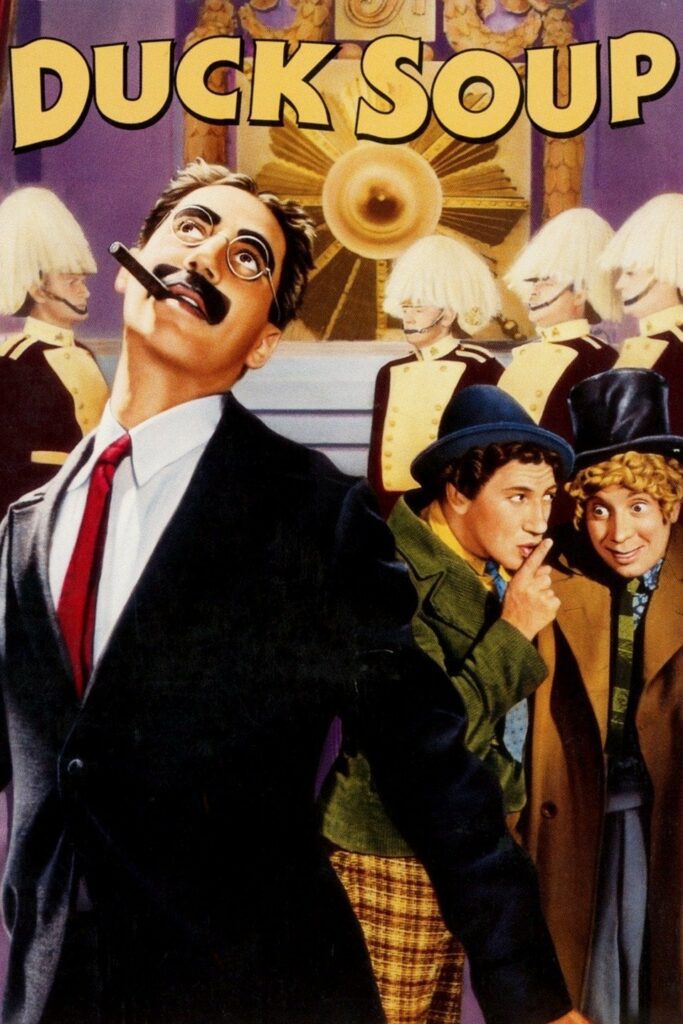
Rory Joscelyne
I always find this kind of article difficult. Really, the best film has to be a bit fun and cheesy, something timeless and classic, able to satisfy the mainstream. Only one film fits that mould for me. The Marx Brothers’ legendary Duck Soup.
The Marx Bros’ started as a Vaudeville comedy family (all actual brothers) who were picked up by Paramount to make some of the earliest “talky” comedies. Starting with The Cocoanuts in 1929, each brother brought something unique to the routine. Groucho had incredible quick-fire wit, Chico was an “Italian” who frequently misunderstood words and could destroy Groucho’s fast wit with pure stupidity. Then there was Harpo – a mute clown-like character who communicated via horns, whistles and absurd facial expressions. This satisfied a wide spectrum of comedy, from slapstick to biting political comments.
Duck Soup was not a hit on release. In 1933 its war themes were perhaps a little close to the bone for many, especially with the Nazis gaining prominence in Germany (which would lead to another World War). Let’s be clear, Duck Soup is not a heavy, moral story, hidden beneath a veneer of comedy (such as Charlie Chaplin’s The Great Dictator); it is a balls-to-the-wall madcap comedy throughout. That said, the idea of a family of Jewish German immigrants mocking the upper classes and politicians so brazenly was not at all the done thing in the 1930s. Perhaps that is why, being the son of a hippy, I was introduced to these incredible comedians at such a young age.
But why Duck Soup? The brothers made 12 mainline movies together, some arguably more famous than this one (A Night at the Opera, Animal Crackers etc.) The answer is a simple one and It’s for the very reason it was so derided back in 1933. It lampoons high society and politics in particular. The script is tight and on-point, with no dead air. It’s the most “modern” of any of the Bros’ movies in terms of pacing and editing. We also see some very early visual effects and sequences, often copied by other famous filmmakers – namely, the amazing ‘Mirror Sequence’ in which Harpo is pretending to be Groucho’s reflection. The scene did not originate with the Marx Bros, (Max Linder had done a version in 1921’s Seven Years Bad Luck and Charlie Chaplin did a variant of it in 1916’s The Floorwalker) but it is arguably the most famous iteration, thanks to the fact the brothers look identical when dressed as Groucho.
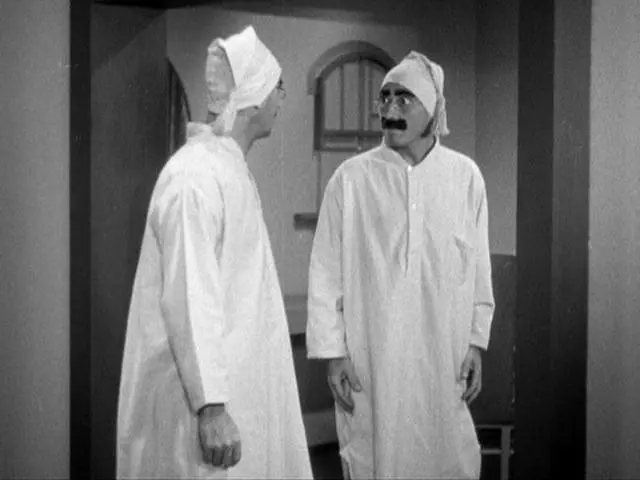
But historical significance aside, Duck Soup is just a laugh-a-second, gag-filled, comedy fest. I’ve shown this film to many people of different ages and almost always received a positive response. Groucho’s back-handed compliments and quick-fire wit rival anyone in the comedian circuit, Harpo’s mime-esque performance has to be seen to be believed and Chico’s irritating and idiotic backchat manages to frustrate everyone he comes into contact with. When all three are at war in the end, the comedy ramps into the absurd, until the satisfying conclusion (which has the brothers throwing vegetables at their female lead, Margaret Dumont) as she dares to sing ‘The Freedonian’ national anthem.
I cannot recommend Duck Soup enough, especially for those looking for a way to enter the classic cinema of its age. It is fast-paced, wacky and just a little bit of a statement, but overall it’s a clear and enjoyable laugh.
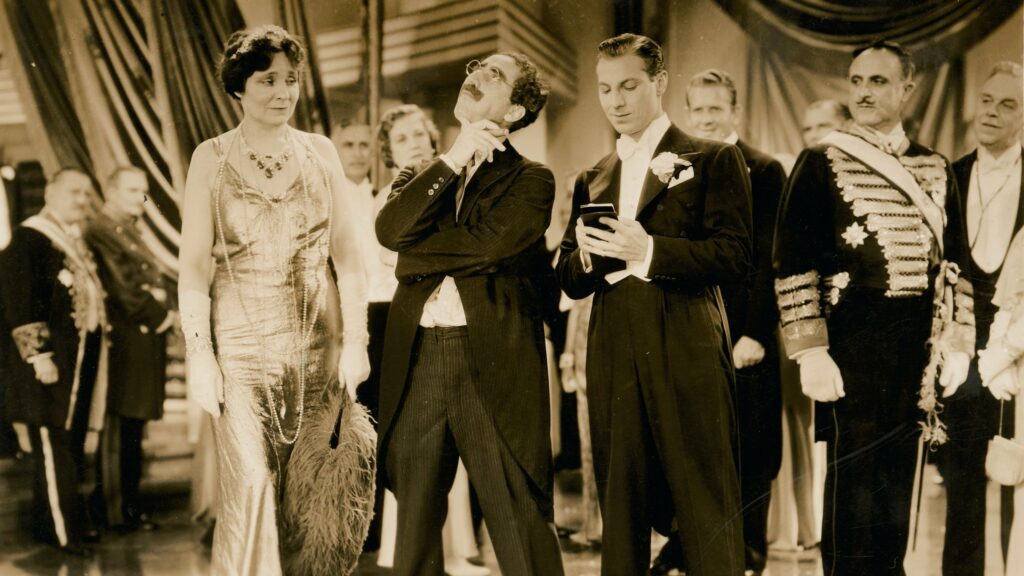
my Thoughts
Comedy is the genre that the average viewer might think is one of the easier ones to make as a film, but as a scriptwriter, there’s nothing harder than trying to make an audience laugh. It’s easy to make one person laugh, but everyone? That’s another level. We all have a different sense of humour, so making a comedy that fills a room with laughter is no small feat. Another great challenge when doing comedy is making something that everyone will enjoy, but also something that will last.
Humour changes for many reasons; either the jokes haven’t aged well, or they just don’t hit audiences as they did back then. As one of the most challenging genres for a filmmaker, to make one, beloved by all, not just at the time but for future generations, is quite some achievement, but for the Marx Brothers, it almost seemed effortless. As you have read Rory, has perfectly explained why this is known as such a beloved comedy. It’s the type of comedy film with something for everyone: from quick-witted one-liners, filled with barbed insults and double entrees, to slapstick comedy, with added gags and catchy musical numbers. What’s more, they create a storyline mocking the upper class and politicians that even viewers today, rather unfortunately, can relate to.
However, it wasn’t just the brothers that made this film what it is. Fellow Actors Margaret Dumont and Louis Calhern, playing straight lace characters, heightened the comedy as we watch them suffer from the brother’s jokes and mischief. Then there’s also the Director, Leo McCarey, forced to try and handle the Marx Brothers’ madness. He used his talent for visual humour from his previous films to develop some of the funniest scenes, including ‘The Lemonade stand’ and the iconic ‘Mirror sequence’. Groucho even attributed the film’s strong satire on war to Leo McCary. The Marx Brothers brought the humour, but Leo’s direction and style helped the film into what it is, a masterpiece of satirical comedy.
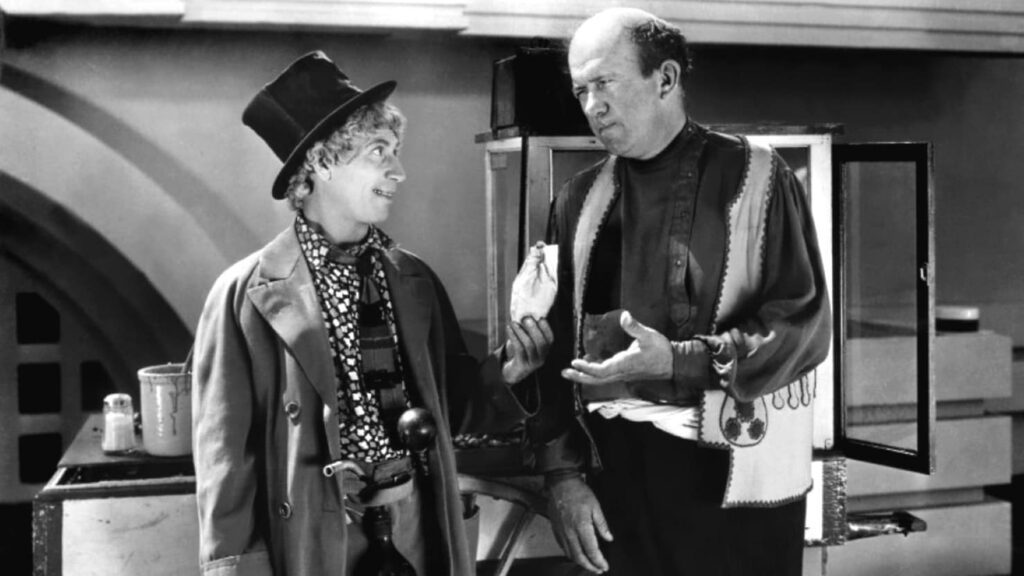
Before watching this film, I only knew of the Marx Brothers by reputation, and I’m sure there are people in my generation who haven’t even heard of them. However, even a novice like me could recognise these men’s impact on comedy and cinema when I watched Duck Soup. From all the comedies I’ve ever watched growing up, I’ve seen snippets of the love film-makers have for this group: Actors doing an impersonation of Groucho Marx with his iconic eyebrows, mouths and cigar, looking to the camera and breaking the fourth wall, the countless times they’ve re-created the mirror sequence; It’s clear the Marx Bros were always an inspiration to people who wanted to make others laugh.
What’s more, they showed that we should not be scared to point at the people above, especially those in power, make jokes about them and point out their flaws. So many comedians, actors, and writers owe them, for paving the way for the future of comedy, as do we, the audience.
As I stated in my opening paragraph – making a comedy that makes everyone laugh, not just at the time, but for the years to come, is anything but easy. Yet as we draw near the 90th anniversary! Of the release of this beloved classic, the Marx Brothers have shown it’s possible. They even make it look child’s play. It’s probably no coincidence then, that in the Dictionary, ‘Duck Soup’ is defined as “An American slang term meaning: something that is easy to do or accomplish”.
My Favourite Fact
As Rory has stated, Duck Soup was quite a controversial film of its time, especially in Italy, where it was banned by Fascist Dictator, Mussolini seeing it as a direct attack towards him. The Marx Brothers were apparently ecstatic when told about this.
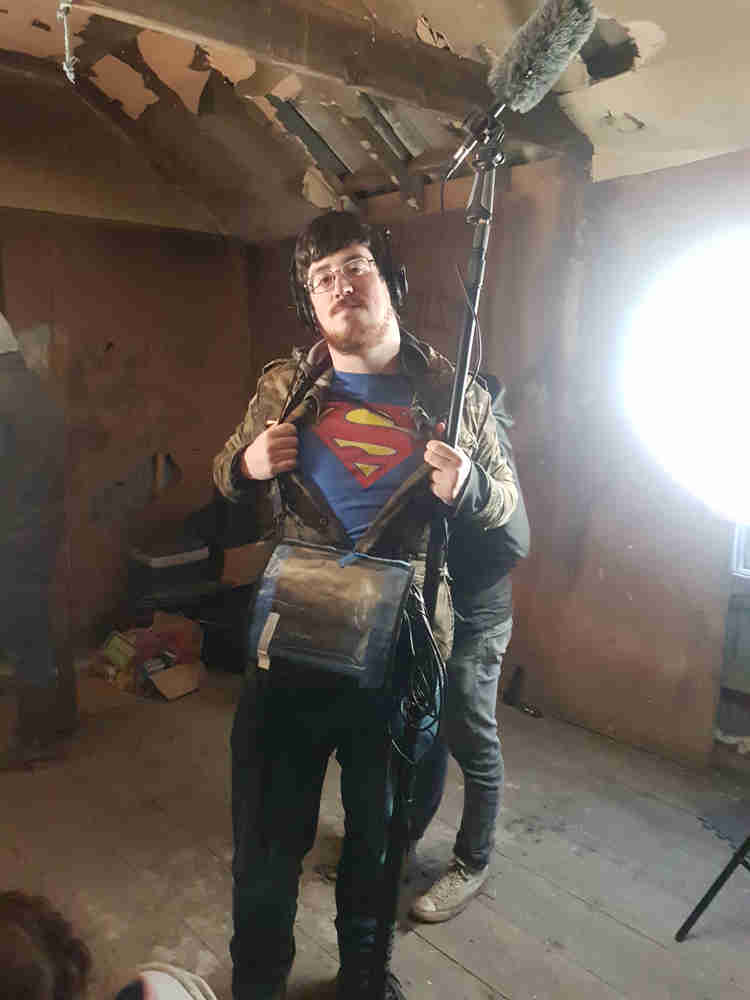
Chris Roberts has worked on many film projects across Essex as a boom operator and production assistant. Chris is a full time film trivia expert!
Rory Joscelyne is a writer and director with a focus on science fiction and emotional dramas. He is currently building funds for his first Feature Film.

